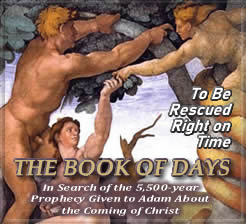His Line Will Continue Forever
A Perpetual Earthly Kingship
Two things arise from—what I’m calling—the tripartite foundational promises of God that are so critical to our investigation. One has immediate application, while the other will provide an important detail later in this discussion.
First, in addition to the dust-like descendants of Abraham and the many nations they are to comprise, God’s promise to King David made it equally clear: The kings coming from the loins of his forefather are to reign over Abraham’s descendants from an earthly throne that’s to be established forever. The psalmist confirmed this when he had God saying:
I won’t violate My covenant or alter what My lips have uttered. Once and for all, I’ve sworn by My holiness; I won’t lie to David. His line will continue forever and his throne endure before Me like the Sun; it will be established forever like the Moon, the faithful witness in the sky.1
Now, when it comes to the typical response as to whether or not this promise of God has been fulfilled, the first thing one hears is, this promise doesn’t have to be fulfilled in a perpetual earthly kingship. It can just as easily be interpreted, many insist, as being fulfilled in the eternal heavenly kingship of Jesus Christ. Sadly, though, this is only possible when you excise the verse in question and isolate it from its proper context. Were it not for the verse following the promise about David’s throne, then certainly, one might concede this perpetual kingdom was fulfilled in Christ. But what does the context provide us, without which “text without context” is error? Of this king in question, Nathan has God saying to David:
When your days are fulfilled and you rest with your fathers, I’ll raise up your descendant after you, who will come from your own body, and I’ll establish his kingdom. He’ll build a house for My Name, and I’ll establish the throne of his kingdom forever. I’ll be his Father, and he’ll be My son. When he does wrong, I’ll discipline him with the rod of men and with the blows of the sons of men.2
Story Continues Below
Says Richard Price—the founder and CEO of Academia.edu—on his podcast In Depth With Academia:
On Earth as It is On Heaven: The Promise of America, Technology, and the New Earth is:
To hear Price’s book review of On Earth as It is On Heaven, CLICK HERE.
To hear Kent discuss the promises of God that pertain to God’s Kingdom on Earth, particularly as they pertain to the nations of the West, with Zen Garcia, the host of the Internet talk show Momentary Zen, CLICK BELOW.
Story Continues From Above
Many are quick to point out here: “Look, this is clearly a descendant who comes from David’s own body and whose throne will stand forever. What else can this be but the everlasting throne of the Lord Jesus Christ?”
And why do they say this, in spite of the verse that states: When he does wrong, I’ll discipline him with the rod of men and with the blows of the sons of men? Why do they say this, in spite of the fact that God never had to discipline the sinless Son of God, Jesus, with the hand of any man? Of course, they say it for the same reason Thomas Paine insisted that God failed to keep His promises in regard to the people of Israel. However, because they don’t want to deny their faith in God, they’re forced to find another way to dismiss what seems to be a lack of performance on God’s part. So they spiritualize the kingship of David, because they too are aware of the traditional view of history that records the end of Judah’s royal line when the Babylonian king blinded Zedekiah and killed his sons. But again, the only problem with that proposition is, the promise to David, of a perpetual earthly kingship, doesn’t go away just because a traditional view of history doesn’t satisfy the requirements of this promise.
That said, the answer to this mystery clearly requires a different solution. One thing is certain, though, when investigating the subject of God’s promises, notwithstanding the objections of skeptics and critics, the acid test is still: Who do you trust, God or traditions?








